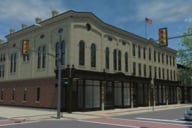You have /5 articles left.
Sign up for a free account or log in.
Last Friday, Alma held a joint celebration of our 125th anniversary and the inauguration. So many in our community contributed to an event that was a great success: turnout was terrific for an event that was full of uplift and promise, despite the challenges. We used the opportunity to feature a symposium on building community and a related workshop, signaling the importance of Alma's efforts to help Michigan thrive in the years to come.
Our students were the main event at the inauguration, which we intended to make less formal than in years past, and the pipers, choir and percussion ensemble made joyful noises indeed. One history class, taught by Professor Jamie Smith, presented on their excellent work in the Alma archives.
I ended my talk, a call to re-imagine the liberal arts college while affirming the values we have held throughout our history, with the thoughts below.
In the years to come, we know we must build on the values we have always held. But we know, too that we cannot be satisfied with simply being what we have been. I am suggesting that our greatest opportunity is to re-imagine what the liberal arts college can be for our society and for the world.
What must such a re-imagining entail? Among the things I think we will need to pursue:
- We must be better stewards of our resources, creating a more sustainable community, respectful of the environment and connected to local farmers, tradesmen and businesses.
- We must better reflect America's rapidly evolving diversity. Like other great liberal arts colleges, we must reach further afield for our next generation of students.
- We must bring the world to our campus and ensure that our students have opportunities to learn through their engagement with the world.
- We must recommit to "citizenship" as the foundation of an Alma education and model citizenship by addressing the real problems of our state, national and global communities.
- We must partner deeply with the off-campus community, extending our resources to help Alma, Gratiot and Michigan thrive.
- In doing all of these things, we must seek to engage the world in the great story of Alma College.
If we are to achieve these goals, we will need to go about our work differently. We will, each of us in this community, need to take on an entrepreneurial spirit that is perhaps not the hallmark of the academy. We must become an institution for a new century of challenges and opportunities, a dynamic model of the habits and practices upon which a sustainable and compassionate community depends. We have the opportunity to be the community that we are preparing our graduates to help create when they leave us.
We will do these things because we must do them if we want an Alma education to be for our students of the next 125 years the life changing experience it has been for our students of the last 125. Just yesterday our almnus Patrick McDounough, who is here today, send a note reminding me of the words of Theodor Roosevelt: “...the best prize that life offers is the chance to work hard at work worth doing.”
*****
I will close with a personal story that suggests for me the nature of our work at liberal arts colleges.
Some years ago I spent five weeks in Nigeria. One week, I was staying with friends in the northern city of Zaria.
That Sunday, these friends, David and Eunice Kitchener, took me to their church, St Bartholemew’s. The church itself remains for me the strongest image from a month in west Africa. The northernmost Christian church when it was built in 1929, it is constructed almost entirely of mud and stands in a bare clay yard so that it appears to have risen up out of the very ground.
That morning, a red Flame of the Forest tree bloomed full against the orange mud of the church’s walls. After the service, which had been translated for me from Hausa, the local trading language, my hosts and I sat outside with others in the bright sun and enjoyed the agusi soup and pounded yam that are staples of the local diet.
After we ate, the younger men among us changed into work clothes to begin the process of bolstering the church’s walls with a new application of mud drawn from a field next to the church. In moments, these parishioners were standing on great long ladders leaning against the church walls to do their work. Dipping their hands into buckets of warm, wet earth, the men painstakingly spackled the walls, the work of their hands countering that of the rains which every spring strive to reduce the structure to the soil from which it was raised.
My hosts told me that with each passing year, the appearance of the church changes: there is more clay in the mud one year, say, or one wall is raised slightly higher than the rest at the hands of an eager worker. The church, we might say, is in a constant state of becoming.
This process, this ritual renewal of the church’s walls, its roof, its cornices and beams at the hands of its parishioners, suggested to me just what it means to be a member of a community grounded in faith: in the face of all of our human doubt and uncertainty, we commit again and again to the seen and unseen ties that bind us. The ongoing toil involved in restoring St. Bartolemew’s, like faith itself, surpasses reason—all the more so since modern building materials are available in Nigeria—and yet this ancient work continues. For my hosts, for me, it reflects the grace of God in our lives, and it asserts the necessity of the communal to the presence of the divine.
The stewardship and the renewal of community, especially a community like Alma founded on an idea, requires the same vigilant attention as does that mud church in the middle of Nigeria. At liberal arts colleges like ours, we are ever in an inchoate state, ever becoming. It is a part of our identity to be always emerging. At Alma, we debate the nature of our being constantly: it’s a part of who we are to engage in a conversation about who we are and that, to me, is in part the excitement of this moment for our college.






